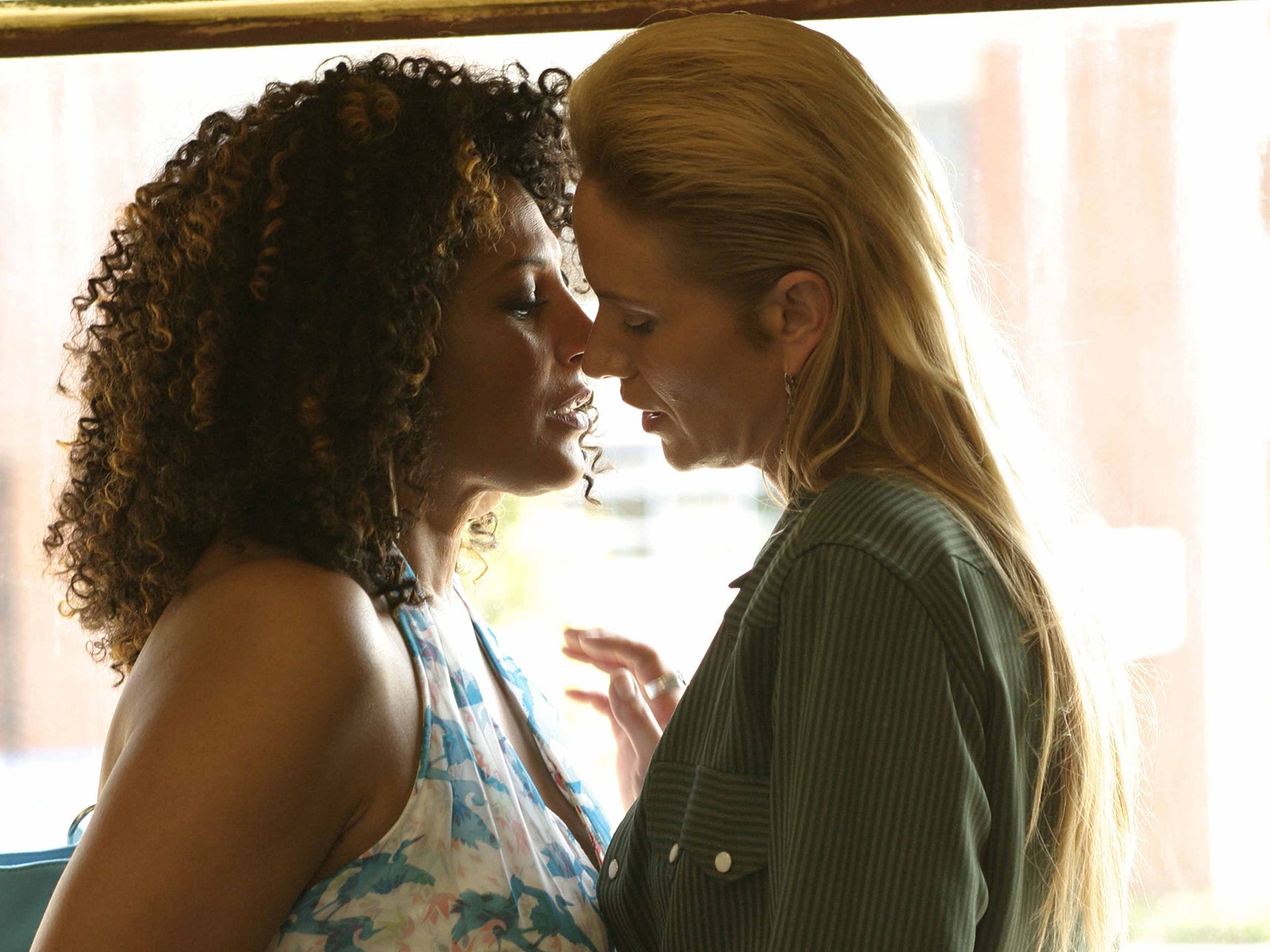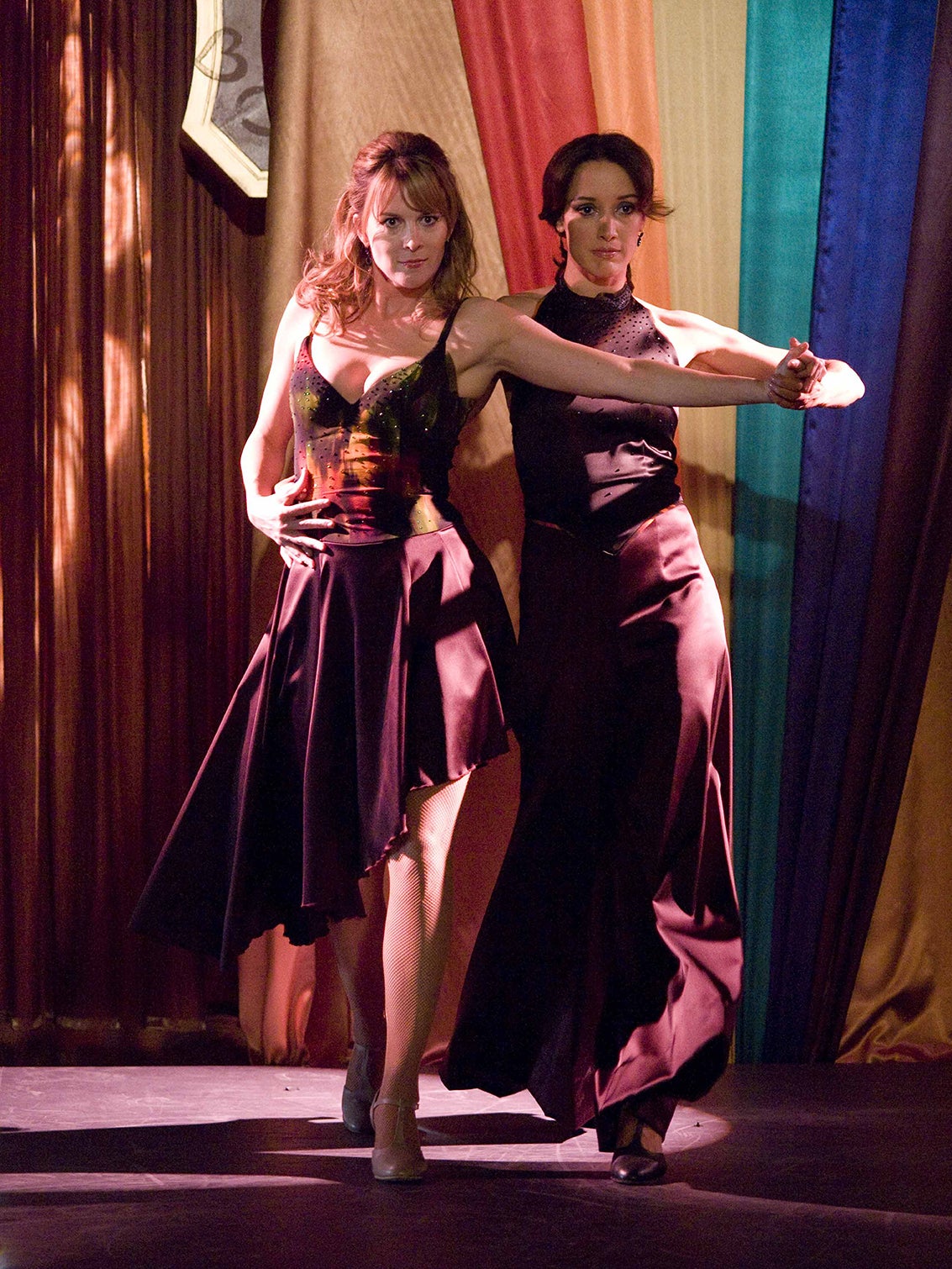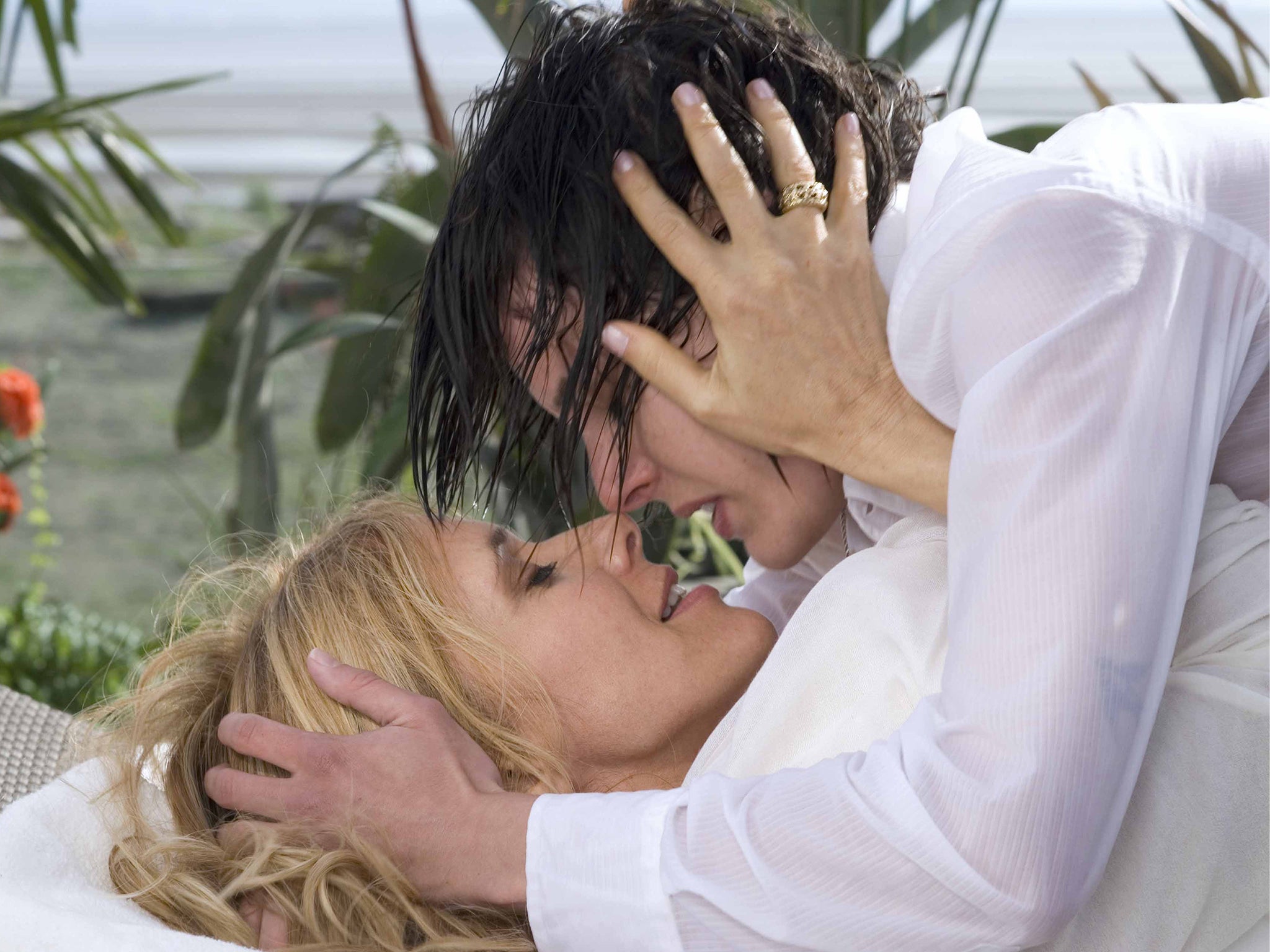Will The L Word reboot fill the need for lesbian representation on our TV screens?
Criticised over the years for its narrow characterisation of lesbianism and failure to properly address transphobia, the new series has fresh scope for a more and inclusive depiction of the LGBT+ community, writes Sirena Bergman


A few minutes into episode one of The L Word, it’s easy to forget there’s anything extraordinary about it: a group of impossibly attractive friends in perfect mid-2000s fashion sit around in a trendy coffee shop all day; a wealthy couple work through their struggles to conceive; a young ingenue moves to LA, and blinded by the bright lights of the big city starts to question her long-term relationship when she meets a seductive stranger.
Of course, The L Word isn’t ordinary, and even watching it today – 15 years after it first premiered, in a time when the LGBT+ community has more visibility than ever before – it still feels unusual to see a television show which revolves around queer women.
Being the main cultural touchstone for an entire community of people across the western world, with a vast diversity of backgrounds, experiences and identities, is a tough cross to bear at the best of times, but The L Word in particular has not aged gracefully.
Creator and showrunner Ilene Chaiken has been heavily criticised over the years for her narrow representation of lesbianism, failure to properly address issues of race and class, and expressing problematic notes of biphobia and transphobia through her characters. The show is by no means perfect, but it’s difficult to overstate its value to the millions of women who had never before been faced with a mainstream representation of their sexuality.
The L Word premiered in 2004, just as TV streaming was beginning to gain traction. With more people than ever before accessing the internet, iTunes and illegal file sharing sites were beginning to foreshadow what would become the normalised form of TV watching among young people. It was this new way of consuming content which allowed young girls still living at home with their parents to take their laptops to their bedroom and binge on the melodrama – and of course, graphic sex scenes – of glamorous lesbian women in LA.
This is what Eilis Hall, now 24, remembers from watching The L Word when she was a teenager growing up in Kent, just as the show itself was winding down its final (and much maligned) series. She says: “I would watch it in secret. I wasn’t out as a lesbian yet but I knew I liked women. Watching The L Word gave me this little space where I felt I could be out with myself. I had never seen so many lesbians in one place before – I was obsessed.”
Eilis had a pen pal from the US who was openly genderqueer and, she recalls, seemed “impossibly cool”. They talked about The L Word, writing back and forth about the characters and storylines. It was Eilis’s first experience of the LGBT+ community she would later come to be a part of.
Ros Ballinger, 27, had a similar experience. She also remembers watching the show as a teenager, and how it impacted her subsequently. “When I went to university I met a community of LGBT+ people for the first time, and The L Word became a sort of springboard. It was a common experience we’d had, that we could all relate to,” she says. She describes how it was a standard conversation opener among queer female communities – everyone had watched it, everyone had something to say about it, everyone identified as a particular character. Being “a Shane” or “an Alice” was shorthand for a personality, gender identity and standing within the community.
I would watch it in secret. I wasn’t out as a lesbian yet but I knew I liked women. Watching ‘The L Word’ gave me this little space where I felt I could be out with myself. I had never seen so many lesbians in one place before – I was obsessed
This remains true today, as the fandom of the show continues, with quiz nights, conventions and endless merchandise available on Etsy. But perhaps the clearest sign of the show’s lasting relevance is the fact that it is being rebooted. Something long rumoured, but only confirmed last month.
We don’t know much about what a new series will look like, but the one thing that fans and detractors alike are hoping for is a more sophisticated, nuanced, inclusive – “woke”, if you will – depiction of the community it’s supposed to represent.

In many senses, it’s a damning indictment of the state of representation of queer women in pop culture that we’re all angling for a problematic soap which ended just 10 years ago to be brought back. Since The L Word wrapped in March 2009, there has been nothing that has come close to it in terms of the sheer visibility it offers queer women.
The L Word premiered just seven years after the infamous “puppy episode” of Ellen, in which Ellen DeGeneres came out as a lesbian, leading to the cancellation of her show. In the interim, lesbian characters were relegated to the sidelines in titillating “otherness” (Buffy), unspoken subtexts (Xena: Warrior Princess), absurdist stereotypes (Sex and the City) and comedic plot points (Friends). What Queer As Folk and Will & Grace did for gay men, The L Word did for gay women. But the trend did not continue.
Eilis mentions Orange Is The New Black, a show often praised for its LGBT+ representation, and acknowledges that in many ways it is making positive steps, but adds: “It’s not centred around an everyday queer experience, it’s still the trope of ‘lesbians in prisons’ and that’s not our reality.”
The Fosters, a family drama centred around a lesbian couple and their children, is also often used as an example of progressive television, but the story remains almost unbearably heteronormative, and doesn’t often deal with the reality of being a queer woman as much as it does that of parenting teenagers. More recently, The Bisexual, which premiered on Channel 4 in October 2018, has gained praise for its depiction of queer women, but that’s one show in over a decade, and it hardly has the influence of American network TV.
Writing for NBC News in 2017, LA-based writer Trish Bendix explains the importance of The L Word in relation to most other shows featuring queer women: “It was so pivotal [because] it provided an aspirational life for many queer women, and in the simplest of ways. Watching a group of individual lesbian and bisexual women who were successful in their careers and able to find and maintain loving and complex relationships with partners and friends and family alike was a sorely needed signal that no matter where you lived, or how old you were, how closeted you were, you were not alone. Somewhere in the world, there are women who love other women, and they are thriving.”
In a way, much of the criticism of The L Word – that it’s too soapy, unrealistic, drama-ridden – is in fact what makes it so poignant for many queer women. It’s not supposed to be educational or instructional – it’s pure entertainment, but it treats being a queer as though it’s the norm. It doesn’t ignore its characters’ sexuality, but neither does it base its plots around it. Yes, there are relationships and affairs and break-ups and an outrageous number of nipple close-ups, but it’s a show about people who happen to be lesbians; not about heterosexual people plus one lesbian whose entire plot point is her sexuality.
Sarah Kessler is a lecturer at University of Southern California, where she focuses on issues relating to gender, pop culture, media and queer culture. She is also the TV editor for online magazine Public Books, where she has written with mixed feelings about The L Word’s legacy.

“Nearly a decade after the series finale, The L Word remains a cultural touchstone,” she writes. “What made the original series so iconic to so many? Part of The L Word’s appeal was and remains its progressivism. However imperfectly, the series took on the neglected and necessary task of representing lesbian lives. But The L Word was also a prime-time soap opera fuelled by girl-on-girl intrigue.”
I spoke to Kessler about how she thought The L Word had impacted the LGBT+ community. “To me, the show presented a possibility of lesbianism that had at the time been unfamiliar,” she said. “I don’t remember seeing lesbians on TV until The L Word, and I still can’t really think of anything that’s doing that work now. There are shows with queer characters but often they are peripheral to a straight lead, and heterosexuality is a dominant sexuality that’s represented. There’s a revolutionary aspect to the show – after all, it’s about lesbians and it decentres men. Something we don’t see that much today.”
Kessler began watching the show when she was living in the Midwest, just as she was coming out as a lesbian. She identifies the show as a “cult object” within the queer community, across generations, but is wary of placing too much emphasis on the need for pop culture to become political.
“Visibility is important and it can change minds in small ways, but I think the value of TV is more as an interesting reflection of where we are at a given time than as something that creates social change.”
Kessler too describes The L Word as a cultural touchstone, a sort of shorthand for queer women. Crucially, she explains, it showed that lesbians are not a monolith. If TV shows incorporate one female character who’s not heterosexual, it’s easy to sink into stereotyping. The fact that The L Word had so much to work with allowed for rich, developed characters who were about so much more than their sexualities.
I asked Kessler about the character of Max. Among women who love the show, this is always a touchy subject. Originally introduced as Moira, Max comes out as a trans man midway through season three. He is in a relationship with Jenny Schecter, the aforementioned ingenue who rapidly and somewhat absurdly morphs from flawed protagonist into pathologically narcissistic villain throughout the show’s run.
“For many people this would have been the first time they saw a trans person on TV, but some of the transphobia it depicts is incredibly uncomfortable, especially rewatching it today,” she said.
It’s hard to say whether the show was trying to depict the transphobia in the lesbian community – something we still see today in the Terf movement (although that’s often geared more towards trans women) – simply for the sake of realism, or whether it was condoning it, but to many people it feels like the latter.
“A lot of women in the lesbian community still have these views about trans people,” observed Eilis, when discussing some of the misgendering, deadnaming and gender negation that Max endures from the main characters on The L Word. “But it was never addressed. There was never a redeeming moment where the characters realised they were wrong.” Indeed, the show seemed to punish Max, writing him out as a sensationalised pregnant man, alone.
Joe (not his real name) is a trans man in his late thirties living in Texas. He doesn’t want to be identified because he is not out within his community. While it makes him angry to think about the portrayal of his gender identity on the show, he still can’t bring himself to fully criticise The L Word for it. “I honestly didn’t even know that being transgender was a thing [until not long before the show aired]. The fact that they talked about it was huge, and actually I did experience being ostracised from my circle of lesbian women. I know how watching it may have been painful to other people, but to me it seemed realistic, and it made me feel less alone.”
While certainly not everyone feels as forgiving towards The L Word for its misgivings, it’s telling that so many do. With the reboot on the horizon, perhaps we’re all feeling a little overly optimistic about the possibility that queer women will once again be given a space within mainstream popular culture, but it betrays a sad reality about the state of the LGBT+ representation today that an overly sexualised, highly unrealistic melodrama that failed on so many counts is the best we can hope for. That said, I’m deep into a rewatch and – for the countless time – I am once again addicted.
Join our commenting forum
Join thought-provoking conversations, follow other Independent readers and see their replies
Comments